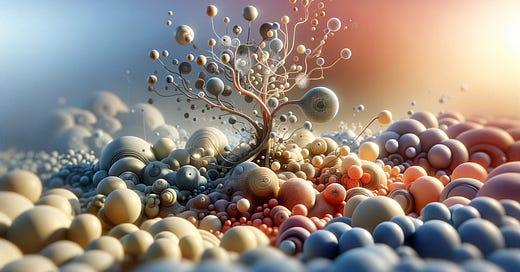Hallucinations are (almost) all you Need
Fundamental research in science is being transformed by hallucinations; the arts are being transfigured by research; and if simulations are integral to cognition, then AI may already emulate a 'self'.
This rapid overview of key scientific AI examples (that covers a year loosely defined as starting with the release of GPT-4 on March 14th, 2023) is framed by the hypothesis that fundamental research in science is being transformed by a practice predominantly associated with the arts: namely hallucinations. Inversely, the arts are being transfigured by a practice predominantly associated with science, namely research.
It’s also a theory about the incipient subjectivity of AI and how that relates to aesthetics.
*
DISCLAIMER: Hallucinations in people are conventionally associated with mental illness, drugs, and/or genius. And hallucinations in AI (mostly in large language models) have been critiqued as net-negatives: contributing to disinformation, bias, post-truth, deep-fakes, collapse of democracy, copyright theft, etc… While cognizant of the multiple potential existential risks of AI (economic perils, bias, disinformation, deepfakes, autonomous weapons, bio-hacks, ...) In this age of reactive anxiety the following is an attempt to energize the ideal of optimal flourishing for all sentient entities.
*
Claim: AI hallucinations (of proteins/crystals/algorithms/circuits etc) pruned down to the feasible, are contributing to a revolutionary acceleration of scientific discoveries. Numeric-algorithmic optimizations, AI hardware accelerators, reward mechanism design, non-invasive brain sensors, drug discovery, sustainable deep-tech materials, autonomous lab robotics, neuromorphic organoid computing, and mathematical reasoning.
In both art and science, hallucinations are almost enough: without the pruning down to the plausible, there is just a sprawl of potentiality.
Using citations from Katherine Hayles, Donna Haraway, Michael Levin, Bud Craig, Thomas Metzinger, the video-lecture advances the speculative notion that if mind is everywhere and simulations underlie cognition, then current AI may already internally emulate incipient self-identity formations.
Slides (without speaking notes)
PDF [video 0.2] (May 31st, 2024, AI and Humaniora Conference, UiB)
PDF [video 0.1] (April 24, 2024, CDN Seminar on AI and Digital Media Aesthetics)
PDF (April 2, 2024, Brain & Consciousness Group (HBF), UiB)
PDF (Feb 24, 2024, ZDHK Immersive Arts)
PDF (Feb 14, 2024, UiB Centre for Digital Narrative)
Based on the enormous mountain of links collected in 2023 in the gdoc AI Spring, this is currently a 30-40 minute talk that will be released in next iteration as an essay, and eventually perhaps as a video. [Now available : http://glia.ca/2024/Hallucinations/]






